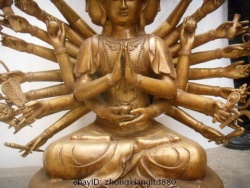Do not Steal
It is a respect to other's properties and the right to own property. If something is not given, one may not take it away by stealing, by force or by fraud. Besides these, one should avoid misusing money or property belonging to the public or other persons. In a broader sense, the second precept also means that one should not evade one’s responsibilities. If an employee is lazy and neglects the duties or tasks assigned to him, he is, in a way, "stealing" time that should have been spent on his work.
In its broadest sense, observing the second precept also means that one cultivates the virtue of generosity. A Buddhist gives to the poor and sick because of their need. He makes offerings to the monks, nuns and masters because he respects the qualities they possess. He is generous in his gifts to his parents, teachers and friends because of the advice, guidance and kindness they have shown him.
Besides giving material things to the needy and the worthy, Buddhists should also offer sympathy and encouragement to those who are hurt or discouraged. It is said, however, that the best of all gifts is the gift of the Dharma in the form of teaching it or in the production and distribution of Buddhist books.
Greed is one of the Three Poisons, which leads us to attachment and suffering. The bad effect of stealing are poverty, misery, disappointment, etc.
